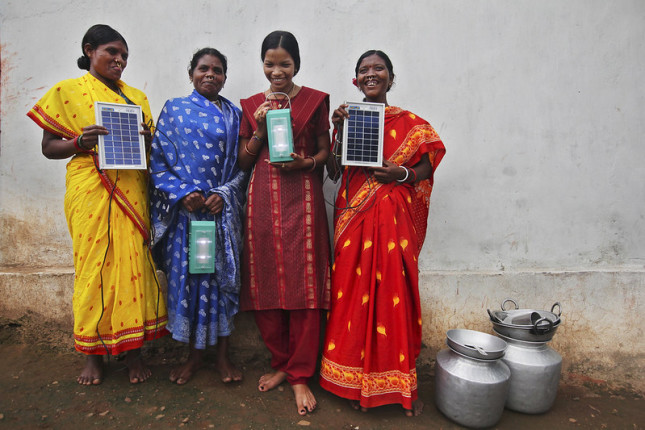-
An Earth Day Appeal for Sustainable Market Solutions
April 22, 2022 By Roger-Mark De Souza
Global insecurity driven by the conflict in Ukraine and pandemic-induced instability has come powerfully into confluence to increase threats to livelihoods across the world.
What can we do to stem the tide? This Earth Day is an opportunity to rally for action that will help us all face such challenges now and in years to come. One of the most powerful ways to do so is to solidify and expand the reach of sustainable markets. There are a number of ways that this process can begin right now.
Battling supply chain and ecosystem disruptions
First, we must tackle the environmental security threats that are at the core of disruptions to the global supply chain. Material shortages, cost increases, and limitations on production capacity impact the supply side; demand volatility, logistical complications, and cybersecurity threats affect global demand.
These dynamics were already at play after more than two years of global pandemic. But the lives lost, food supplies upended, and communities displaced by war in Ukraine are just the sort of new disruptions that will worsen the ongoing humanitarian crisis. These effects also reverberate well beyond Ukrainian borders, given the country’s importance as a and its role in accessing energy sources and critical minerals.
The war in Ukraine can also harm wildlife, generate ecosystem instability, and contribute to air, water, and soil pollution. And the reintroduction of open rhetoric about nuclear weapons use offers the looming potential for nuclear fall-out and its long-term toll on human life and ecological well-being. Already Russian troops have conducted military operations
Such supply chain and ecological disturbances have led to an increasing desire for more localized supply chains, and more encompassing government approaches that will take time and planning to implement.
Leveraging climate finance’s role in a just transition
As we look toward a world where we better manage pandemic risks and find a path to peace in Ukraine, we also must take the opportunity to usher in a just transition in the United States and globally.
A just transition promotes a green economy that is fair and inclusive, and incorporates decent work, poverty eradication, and social inclusion. Part of that transition requires mobilizing impactful development and climate finance to increase equity, community well-being and sustainable livelihoods. Providing adequate financing for climate is a moral, ecological, and economic imperative.
Above all, a just transition will unlock innovative and sustainable responses, bringing opportunities for blended finance that include the private and public sectors. We must seek climate-smart finance and access to customized financial services and products, as well as promote the adoption of environmental, social, and governance standards.
Such efforts, however, require a continued focus on local people, cultures, and socio-economic dynamics at the center of climate-smart development approaches. Community engagement must be the cornerstone of these innovations. If we build on existing community promise, we can ensure active participation in this just transition.
Communities also must remain front and center in climate adaptation and mitigation efforts. Climate finance provisions must meet their needs, as well as retain a focus on allowing businesses to thrive. Increasing household resiliency and finding ways to protect the vulnerable (such as reducing child labor) will require bolstering social protections, as well as improving access to resources and government services.
Stimulate economies via standards and traceability
Finally, we must stimulate economies with a view to ensuring long-term sustainability. Expanding opportunities to increase energy access, live innovatively within Earth’s natural limits, and plan for accountability and traceability in the extractive sector are all part of such an effort. Certification, traceability, and due diligence systems for natural resources in areas where security and human rights are at risk also continue to be critical. We must increasingly examine our development approaches through the evaluative lens of supply chain transparency, and determine systems for traceability and due diligence that can be applied to other natural resources.
My home organization, Pact, is a recognized leader in sustainable markets. Our environment, energy, livelihoods, and extractives teams bring technical and impactful approaches to meet such challenges through engagement with governments, communities, and the private sector.
Our corporate partners are situated at every link in the minerals supply chain, ranging from upstream producers (almost 300 local mining companies and cooperatives), to some of the world’s largest commodity traders (e.g., Trafigura) and major business associations (such as the Responsible Business Alliance), down to consumer-facing companies (e.g., Apple).
One example of Pact’s work in this area is the implementation of the system that enables half the world’s tantalum—which is essential for the IT and communications sector—to be produced in conflict-free settings by and from artisanal and small-scale miners and then sold on the international market.
In one of our largest programs, we are leading the implementation of the International Tin Supply Chain Initiative (ITSCI) system. Pact works within over 2,000 artisanal and small-scale tin mines across the DRC, Rwanda, Uganda, and Burundi, bringing together myriad local and international mining stakeholders. The ITSCI program offers a traceability and due diligence system that ensures local and international companies responsibly trade 3T minerals (tin, tungsten and tantalum) from Africa’s Great Lakes Region.
Mineral traceability and due diligence are fundamental to establish a verifiable chain of custody from mine to smelter and, ultimately, to end user, ensuring that the minerals are conflict-free, and do not violate basic human rights, including sexual and gender-based violence. Since 2010, Pact’s partnership with the International Tin Association (ITA) has improved the lives and livelihoods of more than 100, 000 artisanal and small-scale miners in the region.
Sustainable and successful
Earth Day offers us a chance to renew our commitment to expanding an integrated sustainable markets approach to our challenges. One that provides transformative and innovative solutions based on environmental security, community well-being, and long-term corporate engagement. It’s an approach that puts people at the center of profitable and transparent businesses. That’s a commitment that Pact is already helping to make happen—on this Earth Day and on many more to come.
Roger-Mark De Souza is the Vice President for Sustainable Markets at Pact and a Global Fellow with the Environmental Change & Security Program.
Sources: Grist; The New York Times; Harvard Business Review; International Labour Organization; Pact
Photo Credit: Female solar engineers in Tinginaput, India bring electricity to their remote village, courtesy of Abbie Trayler-Smith / Panos Pictures / UK Department for International Development, Flickr user DFID.
 A Publication of the Stimson Center.
A Publication of the Stimson Center.






